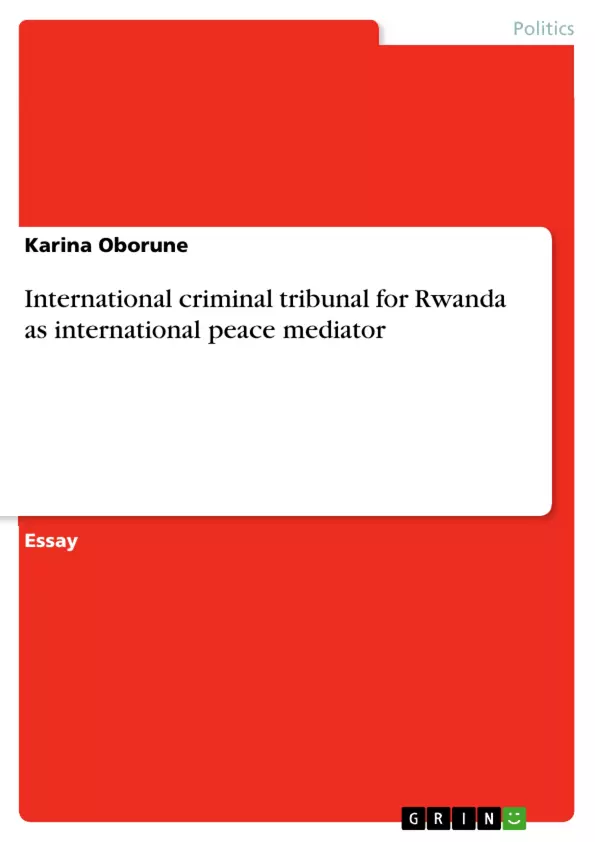In the last fifteen years performance of mediators in the circumstances of lack of specialized training and background information has proved that UN ad hoc quality is too dependent on „trial and error“ (UNSC, 2009: 15). The case of ethno-political conflict in Rwanda (Baechler, 1998: 26) and performance of International Criminal Tribunal for Rwanda (ICTR) is one of such examples.
UN Security Council Resolution 955 (UNSC, 1994: 1) as an aim set to achieve reconciliation and maintenance of peace. Unfortunately this aim has not been achieved: many people do not know about ICTR and those who know do not evaluate ICTR as successive in reconciliation. Only 36 per cent of Rwandans see any reconciliation (Cobban, 2006: 22-28). Moreover, over 80 per cent of Rwandans know little or nothing about the work of the ICTR (Sisson, 2006: 9).
Author of this essay has chosen to deal with a comprehensive task to evaluate ICTR as a mediator. In this case ICTR is international, completely independent ‚outside’ mediator (Swisspeace/CSS, 2009: 3). Author has emphasized following five weaknesses of ICTR: lack of protection, lack of material support, lack of psychological support, lack of gender-perspective and need for education programmes. In the final part author drafted questions which should be asked by mediator.
Inhaltsverzeichnis (Table of Contents)
- INTRODUCTION
- LACK OF PROTECTION
- LACK OF MATERIAL SUPPORT
- LACK OF PSYCHOLOGICAL SUPPORT
- LACK OF GENDER-PERSPECTIVE
- NEED FOR EDUCATION PROGRAMMES
- CONCLUSION
- QUESTIONS FOR THE MEDIATOR
Zielsetzung und Themenschwerpunkte (Objectives and Key Themes)
This essay critically examines the role of the International Criminal Tribunal for Rwanda (ICTR) as a mediator in the post-conflict context. It evaluates the ICTR's performance in promoting reconciliation and peace in Rwanda, highlighting key shortcomings and missed opportunities.
- Lack of effective witness protection
- Inadequate material support for victims and survivors
- Insufficient psychological support for traumatized individuals
- Lack of gender-sensitive approaches to conflict resolution
- The need for comprehensive education and re-education programs
Zusammenfassung der Kapitel (Chapter Summaries)
- The first chapter highlights the significant lack of witness protection provided by the ICTR, with examples of survivors being harassed, threatened, and even killed. It points to the inadequacy of the protection program and its failure to meet the complex needs of victims.
- The second chapter addresses the shortage of material support offered by the ICTR. It argues that the vast sums spent on the tribunal could have been better allocated to social programs in Rwanda, which would have had a greater impact on people's lives and long-term peace building.
- The third chapter examines the absence of psychological support for witnesses and survivors, emphasizing the need for mental health services, especially for victims of sexual violence. The chapter highlights the disparity between the treatment of perpetrators in prison and the inadequate care offered to victims.
- The fourth chapter discusses the lack of gender-sensitive language and approaches employed by the ICTR in addressing gender-relevant issues in the Rwandan context. It emphasizes the importance of gender-specific perspectives for achieving sustainable peace and reconciliation.
- The fifth chapter argues for the necessity of education and re-education programs to promote tolerance and peace building in post-conflict Rwanda. It emphasizes the role of education in fostering understanding and reconciliation between communities.
Schlüsselwörter (Keywords)
The main keywords and focus topics of this essay are: international criminal justice, peace mediation, post-conflict reconciliation, Rwandan genocide, witness protection, material support, psychological support, gender-sensitive mediation, education programs, and the International Criminal Tribunal for Rwanda (ICTR).
Frequently Asked Questions
What was the primary goal of the ICTR?
According to UN Resolution 955, the ICTR aimed to achieve reconciliation and maintain peace in Rwanda following the ethno-political conflict.
How successful was the ICTR in achieving reconciliation?
The essay suggests the success was limited; only 36% of Rwandans perceived any reconciliation, and over 80% knew little to nothing about the tribunal's work.
What are the main weaknesses of the ICTR identified in the essay?
The author highlights five major weaknesses: lack of witness protection, material support, psychological support, gender-perspective, and education programs.
Why is psychological support for witnesses crucial?
Many witnesses and survivors were severely traumatized, especially victims of sexual violence, and the disparity between the care for perpetrators and victims was significant.
What is the role of education in post-conflict Rwanda?
The essay argues that comprehensive education programs are necessary to promote tolerance, understanding, and sustainable peace building between communities.
- Arbeit zitieren
- Karina Oborune (Autor:in), 2009, International criminal tribunal for Rwanda as international peace mediator, München, GRIN Verlag, https://www.grin.com/document/156857



